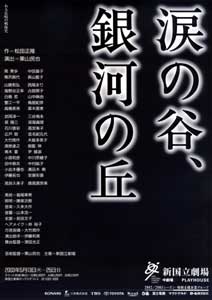
The highly-acclaimed young playwright Matsuda Masataka has written
a series of plays that are set in his own native Nagasaki. His
style, which highlights the inner world of people living in Nagasaki
through conversations that are casual and unsentimental, once
again makes a vivid impression in HAHATACHI NO KUNIE (Towards
the Mothers' Country), written in 2001 to address the theme of
"An Era and Memory." Nagasaki is a land of faith, a
land connected to the continent on the other side of the ocean,
and also a city that achieved remarkable reconstruction after
being devastated by the atomic bomb. Striving to link this historical
reality to the present day, Matsuda wrote a long play called NAMIDA
NO TANI, GINGA NO OKA (The Valley of Tears, The Hill of the
Milky Way), which could be considered the culmination of his past
efforts.
The setting is the Urakami district of Nagasaki, which had been
burnt to the ground, in the winter of 1945. Four sisters and their
baby brother return to Japan from Korea with nothing except the
clothes on their backs. The play looks at how the four sisters
and brother, as well as others who they came into contact with
along the way, carved out a life for themselves while being tossed
about the current of the times that stretched from Japan's wartime
defeat through the period of rapid economic growth and up to the
present day, continually holding out hope for change but being
disappointed its results. In the turbulent sixties, the sisters
and brother continue to ponder the question of how to live, at
times drifting along with destiny, and at other times defying
this fate. Focusing on the path that these characters took, the
play looks back at the history of postwar Japan from a new perspective.
A dramatic world is conceived for the large space of the Playhouse.
As a drama that deals with large groups of people and spans a
long period of time "NAMIDA NO TANI, GINGA NO OKA
is an attempt to dynamically break new ground never seen before
in Matsuda's plays. The director will be Kuriyama Tamiya, Artistic
Director for the NNTT's Drama Division, who has worked with the
playwright since the plan for the performance of the play at the
theatre was conceived. In directing, Kuriyama has always tried
to grasp the essence of a play's written words, and at the same
time construct what lies between the lines into a beautiful spatial
world that merges with art and music. It will be quite interesting
to see what dramatic space will be created when Kuriyama confronts
the spiritual world particular to the playwright, which underlies
human dramas he depicts. The actors and actresses appearing in
the play, starting with those who play the four sisters, are all
talented and active on the stage, as well as in movies and on
television, and have had a strong influence on both the playwright
and the director. NAMIDA NO TANI, GINGA NO OKA fits perfectly
with the NNTT Playhouse's on-going theme of "An Era," and we hope
you take the opportunity to be a witness to the birth of a play
that might be considered the Japanese War and Peace. |

